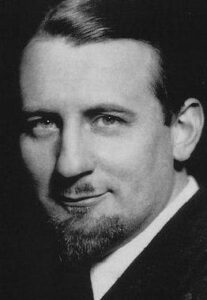Warlock, Bethlehem Down
 Peter Warlock is the pseudonym of Philip Arnold Heseltine (1894-1930). Heseltine was born in London to a wealthy family. His father soon died and his mother was remarried to a landowner in Wales. Heseltine’s Welsh roots would form part of his lifelong interest in Celtic folk songs.
Peter Warlock is the pseudonym of Philip Arnold Heseltine (1894-1930). Heseltine was born in London to a wealthy family. His father soon died and his mother was remarried to a landowner in Wales. Heseltine’s Welsh roots would form part of his lifelong interest in Celtic folk songs.
Heseltine became known both as a composer and a music critic. His provocative writing style earned him a reputation for directly challenging the prevailing sentiments and feuding with other critics.
But Heseltine’s real devotion was to Frederick Delius. While only a teenager, his family connections enabled him to meet Frederick Delius in 1911 at all-Delius concert conducted by Thomas Beecham. The two struck up a friendship. Delius was impressed by Heseltine’s fluid writing style and encouraged his musical ambitions. Heseltine became a strong devotee of Delius and would go on to make piano arrangements of Delius’s music and later penned a biography of Delius.
His personal and professional life were both marked by instability and later depression. He attended Eton College for a short while and then went to Christ Church, Oxford to study classics. His interest in music drove him to the conservatory in Cologne, but that venture was cut short by the outbreak of war in 1914. He then resumed his studies of the classics in London, but abandoned them in 1915 when he was offered a job by The Daily Mail, a position he held for only a year. He would write for various publications and became the editor of The Sackbut in 1920, but was replaced barely a year later when that publication was sold.
To some extent his devotion to the music of Delius was overshadowed by the influence of Dutch composer Bernard van Dieren, who spent most of his professional life in England. He also championed early music. He wrote a book on Gesualdo and another on Elizabethan music.
Heseltine’s compositions focused on songs. Perhaps because of the controversial nature of his writing, he published a set of songs in 1918 under the pseudonym Peter Warlock and continued to use that name on subsequent compositions. Although he lacked formal training in music, his deep knowledge of literature and folk songs, along with a natural gift for melody, enabled him to craft a body of highly regarded songs.
Bethlehem Down was written in 1927 with poet and journalist Bruce Blunt and quickly became a Christmas favorite.



